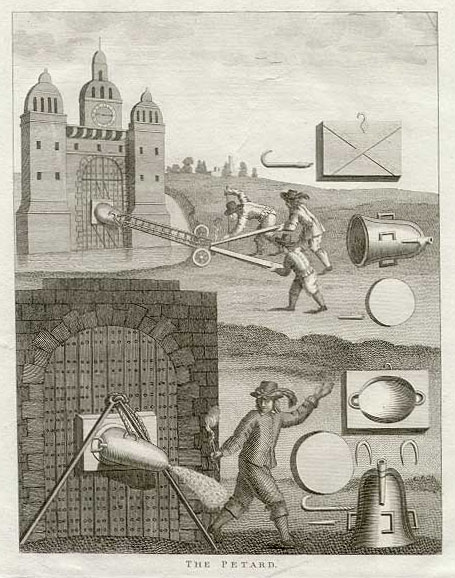When I come across the same not so common phrase within a couple of hours, it gets me reflecting. I do know what it means to be "hoist upon one's own petard". It means something like, to be skewered by one's own argument. And I also believe, though with less confidence, that the petard in question is some sort of sword or lance, something in other words that one could be impaled upon. But that doesn't mean that I know what a petard is more specifically, or how this rather technical phrase passed into our more usual vernacular. Shall we find out?
...Wrong again, Watson. But I'm sure that any French speakers among us already know that. Also, closer readers of Shakespeare than I am, apparently. My long held imagery blown up in an instant.Not a soldier tripping on his sword on the battlefield, but rather an 'engineer'falling victim to his own contraption.To be hoist on one's own petard is to be blown away--quite literally.
A petard is a bomb. Not a high tech bomb, because the word dates back a few centuries. It was the kind of bomb back then that was planted to breach walls and blast through gates. Gunpowder inside a metal container and with a slow fuse usually did the trick. Emphasis on usually.
The word comes from the Middle French peter, "to pass wind". In French, it remains a current word--it's the name for firecracker, and more slangily, either a joint or a pistol. It crossed the Channel in time for Shakespeare to use it in one of his greatest plays, which is why we know it, and why I should have known its true meaning before this (the variant spellings are his, not mine) :
Let it work;
For 'tis the sport to have the enginer
Hoist with his own petar; and 't shall go hard
But I will delve one yard below their mines
And blow them at the moon
For those who don't already recognize it, that's a princely fellow foiling the plans of a couple of school chums. That's all I'm saying.
Packing for This Long Journey
-
*Cartographies of Home*
by Priscilla Long
MoonPath Press, 2026
reviewed by Carmen Germain
The multi-layered, ghost-like, and welcoming orange-green-umb...
4 hours ago

































Seana -
ReplyDeleteRe: your last post - catamite is a word I ran across in McCarthy's The Road. It was one of the few times that context enabled me to understand it. (But just to be sure, I did look the word up)
Nice work here with petard.
Thanks, Brian. Yes, context is usually the fall back for me too. But as with words like this one was for me, there is the possiblity that you will get it wrong somehow initially, and then just stay wrong for years and years and years.
ReplyDeleteSo where did you weigh in on The Road?
And, quite off topic, how's that little daughter of yours?
And now I might dig out my copy of "Rosencrantz & Gildenstern Are Dead" after a series of google switchbacks!
ReplyDeleteYeah, funny how the old Google machine can take us off on unexpected errands. And I finally saw that movie on Netflix not all that long ago, though long enough for me to have forgotten most of it.
ReplyDelete